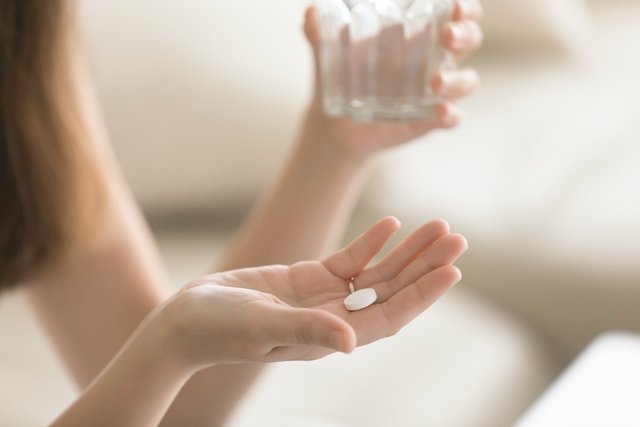Domperidone is a medication with antiemetic action that stimulates stomach and intestinal flow. It is prescribed for the treatment of conditions related to delayed gastric emptying, like indigestion or gastroesophageal reflux (GERD), or nausea and vomiting related to cancer treatments.
This medication can be found in 10 mg pills or in oral suspensions of 1 mg/mL or 5 mg/mL in its generic domperidone name, or under the brand name Motilium.
Domperidone can be used by adults or children over 12 as prescribed by a doctor.

What is it used for?
Domperidone is prescribed for the treatment of digestive problems associated with delayed gastric emptying, like:
- GERD
- Esophagitis
- Indigestion
- Abdominal distension
- Upper abdominal pain
- Excessive burping or gas
- Heartburn
- Burning sensation without reflux
Domperidone is also indicated for cases of nausea of vomiting caused by gastric or intestinal flow problems, cancer treatment, infections, food poisoning or to treat side effects of certain Parkinson’s medications, like levodopa or bromocriptine.
Domperidone for lactation
Domperidone has no official indication approved by the FDA for increasing breast milk production during lactation.
However, some studies have shown that domperidone has a galactagogue effect, meaning it stimulates breast milk production by increasing blood levels of prolactin. This hormone is responsible for stimulating milk production in the mammary glands.
In addition, these studies have shown that domperidone is safer to use than other drugs that stimulate breast milk production, such as metoclopramide, for example, because it doesn't act on the brain, is better tolerated and causes fewer side effects.
Although it does not having an official indication for breastfeeding, domperidone can be prescribed for off-label use by the obstetrician-gynecologist during lactation to increase milk production. The doctor should first first assess the woman's health and the risks and benefits of its use before prescribing to ensure safety and outline a treatment duration.
Check-out other ways to increase milk supply.
Domperidone for diarrhea
Domperidone is not indicated for the treatment of diarrhea, as its main effect is to delay gastric emptying in conditions like GERD, indigestion, heartburn or abdominal distension.
It is especially worth noting that one of the side effects of this medication is diarrhea.
However, one study showed that domperidone can be used to avoid hospitalization in cases of acute diarrhea by reducing the frequency of intense vomiting. However, no changes were recorded in relation to diarrhea, so more studies are needed to verify this effect. Learn more about the diarrhea medicine you can take instead to treat loose stools.
How to take
Domperidone should be taken orally, 15 to 30 minutes before meals and, if necessary, at bedtime.
It should only be taken as prescribed, and the duration of treatment should be a maximum of 1 week for nausea and vomiting, or up to 4 weeks for other indications.
1. Domperidone 10 mg
The recommended dose for adults and adolescents over 12 years of age and weighing more than 35 kg is one 10 mg tablet, 3 times a day.
The maximum daily dose should not exceed 40 mg per day.
2. Domperidone oral suspension 1 mg/mL
For children or adolescents under 12 years of age and weighing less than 35 kg, doses should be calculated by the pediatrician according to age and body weight.
Possible side effects
The most common side effects that can occur during domperidone treatment are depression, anxiety, decreased libido, headache, drowsiness, agitations, diarrhea, acne, itching, increased breast sensitivity, increase milk production, lack of period, breast pain and muscular weakness.
Although these are more rare, domperidone can also cause serious cardiac arrhythmias, agitation, nervousness, convulsions or serious allergic reactions that require immediate medical attention. Therefore, if you experience any of these symptoms, you should discontinue treatment immediately and proceed to the closest hospitals, especially if you have other symptoms like difficulty breathing, coughing, chest pain, swollen throat, or a swollen mouth, tongue or face.
Who should not use it
Domperidone should not be used for breastfeeding or for children under 12 who weight less than 35 kg. It is also contraindicated for people with an allergy to domperidone or to any of the components in the formula. Additionally, use should be avoided by those with a history of bleeding, obstruction of gastrointestinal perforation.
This medication should be avoided during pregnancy or breastfeeding, and should only be used as prescribed.
In addition, domperidone should not be used by people with a history of a pituitary tumor, severe stomach pain, persistent dark stools, or liver disease. People who take medications for infections, metabolism or altered cardiac rhythms (like itraconazole, ketoconazole, posaconazole, voriconazol, erythromycin, clarithromycin, telithromycin, amiodarone, ritonavir or saquinavir) should also not use this medication.
